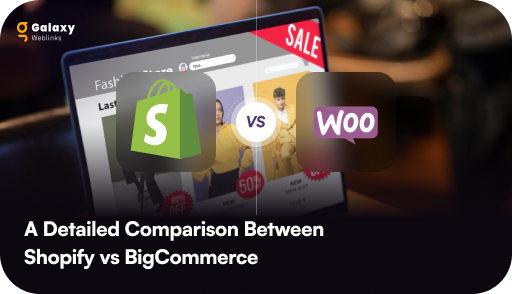eCommerce is constantly evolving with new market trends and technologies accelerated by skyrocketing online shopping. As per GrandViewResearch’s report, the eCommerce market size is expected to reach USD 83.26 trillion by 2030.
The data shows the immense opportunities that this market segment offers to businesses. However, when it comes to e-commerce development, you should always look for fresh ideas and trends that are shaping the future of eCommerce.
Over the years, there have been many technological advancements that have shifted consumer behaviors and transformed digital experiences. So, if you are considering developing an e-commerce store, you must look for the top trends in 2025.
In this blog, we are going to discuss these top ecommerce development trends in 2025 to help you build a cutting-edge online store that will fit modern users’ needs.
Key eCommerce Development Trends to Watch in 2025

Trends are new features, methods, and online shopping innovations that take ecommerce to the next level. With these trends, you can not only enhance your e-commerce customer journey but also improve your online store to ensure customer retention and loyalty. Let’s check out the key trends for ecommerce development to look for in 2025.
AI in Personalization & Recommendations
Artificial Intelligence is now playing a vital role in e-commerce with predictive analytics and recommendation engines. In 2025 and beyond, the use of AI will increase in e-commerce development as investment in AI-based personalization and recommendation engines rises.
AI-based personalization enables ecommerce businesses to offer a tailored user experience based on their location, preferences, and search history. With the help of AI, recommendation engines can identify patterns in the shopping behaviors of consumers and, based on them, provide product recommendations.
Personalization helps e-commerce businesses tailor customer journeys right from searching for products to checkout. AI also helps businesses improve operational efficiency by aiding in managing inventory and the supply chain.
The Rise of Omnichannel Experience
Another hot trend in ecommerce development is the omnichannel experience that focuses on creating a seamless customer journey across different touchpoints. In simple words, your customers should feel delighted whether they purchase via your mobile app, ecommerce site, offline, or POS.
You can leverage microservices to cater to different channels, in-store screens, apps, smart TVs, and VR shopping. User expectations differ for every channel, like tapping on a mobile vs. browsing content in detail on a desktop. You need to tailor the digital experience for different channels. This can be achieved with a headless commerce development and building a custom frontend for every channel, like a mobile app, website, web app, etc. It helps you build a seamless digital shopping experience that your customers will love, resulting in higher conversion and sales.
Voice Search for Easy and Quick Shopping
Voice search has been around for some time since Alexa, Google Assistant, and Siri voice assistants were launched. People used them not only for information but for shopping too. Moreover, AI-enabled voice search takes this to the next level and enhances the shopping experience.
By optimizing for voice search, ecommerce businesses can ensure that their store is visible in these searches. People can use voice commands to order a product or food. When your store is optimized for voice searches with physical address, website, business hours, phone numbers, etc, this drives traffic to your site and increases sales.
Chatbots Help Customers Answer Their Queries
Chatbots are among the topmost ecommerce development trends in 2025 that allow businesses to automate customer support services. With the help of chatbots, customers can get instant answers to their queries and find solutions to their problems, related to order processing, refund, checkout, or anything else.
With the integration of AI-powered chatbots, your ecommerce store can manage customers efficiently while ensuring the best shopping experience. AI chatbots can interact with customers just like a human customer executive would and offer assistance based on their queries or issues.
Your ecommerce business can unlock the potential of chatbots by leveraging Gen AI technology to further enhance the capabilities of these chatbots with sophisticated machine learning models. Such chatbots will analyze data and identify patterns to help customers resolve their queries quickly and efficiently. This will improve the overall digital shopping experience of customers and create brand loyalty.
AR/VR for Next-Gen Digital Shopping Experience
One of the major ecommerce development trends today is the implementation of AR (Augmented Reality) and VR (Virtual Reality) functionalities. These technologies take online customer experience to the next level by offering innovative ways to buy products. For example, ecommerce stores can offer virtual try-ons to help customers choose the best outfit for themselves by trying it live virtually while shopping online.
Similarly, customers can check sunglasses or normal specs in real-time by virtually wearing them online on an ecommerce platform. So, it offers a unique shopping experience that helps them make the right choice before even visiting a store physically.
Composable Commerce for Scalability
A notable ecommerce development trend in 2025 is composable commerce, which focuses on developing more scalable and flexible ecommerce stores. To achieve this, it emphasizes creating ecommerce stores that are decoupled and modularized.
Unlike traditional monolithic ecommerce stores that have frontend and backend intertwined with each other, composable commerce stores are more flexible, built on microservices, and leverage APIs for delivering content to different frontends tailored to each ecommerce channel like PWA, web app, mobile app, etc.
Such ecommerce stores are highly flexible due to loose interdependence between components and can be tailored to specific user requirements. They are also very scalable because any component or module can be scaled quickly without affecting the functionality of other components or modules.
Composable commerce enables your business to deliver a seamless e-commerce experience and scale faster. Besides, you can choose the ecommerce technology of your own preference, helping you build a robust ecommerce store.
Social Commerce Becoming Trending
Social media is no longer just a platform to connect with friends and family; it’s also a platform to connect with sellers. Indeed, social media has now become a key platform for ecommerce businesses to sell their products, which they can do by integrating it into their shopping journey.
It is one of the most crucial ecommerce trends in 2025 and enables businesses to expand their sales channels. There are many ways products are featured to users on social media, like live-streamed videos, embedded product pages, influencer videos, brand promotion content, and more.
Innovative Payment Methods are Emerging
There is also a trend in ecommerce development related to payments. BNPL (Buy Now Pay Later) is a trending payment method that involves an arrangement to buy something now, while the payment is made later, usually in installments.
With these payment options, ecommerce sellers can increase their customer base and sales. This flexible payment option attracts even those customers who hesitate to buy due to financial issues. By integrating the BNPL payment method into your ecommerce platform, you can offer more diverse options to buy and pay.
To Wrap Up
The ecommerce landscape is changing rapidly with new innovations and trends. Those businesses that are abreast of these changes will lead, and those that fail to adapt will be left behind. Understanding these trends and implementing those that can take your ecommerce business forward is essential for both sustenance and growth.
E-commerce development trends like AI-enabled personalization, chatbots, composable commerce, and voice search are the next-gen features that you can implement in your ecommerce store and offer a top-notch online shopping experience.
You can stand out by implementing the top ecommerce development trends 2025 with Galaxy Weblinks. We are a highly experienced ecommerce development company specializing in creating a wide range of ecommerce solutions – website, mobile app, and PWA.
We help you build cutting-edge ecommerce stores with next-gen features like chatbots, voice search, AR, and more. We have worked with various companies ranging from startups to enterprises, helping them build robust ecommerce solutions, both B2B and B2C.
Contact us to discuss your project and let’s build a next-gen eCommerce website.
Frequently asked questions
Which top trends are shaping the future of eCommerce?
The key trends that are shaping the future eCommerce include AI-powered personalization, chatbots, omnichannel experience, voice search, and headless commerce. With these trends, brands can deliver a more dynamic, immersive, and flexible eCommerce experience.
Are data privacy and security becoming more important in eCommerce?
Yes, considering the rising cost and number of cyberattacks, data security and privacy are becoming among the most important factors in the development process. Therefore, eCommerce businesses are investing in data privacy and security.
How is AI transforming the eCommerce landscape?
Artificial Intelligence is being leveraged in eCommerce development to build smart chatbots for product recommendations, predictive analytics, and hyper-personalized shopping experiences.

